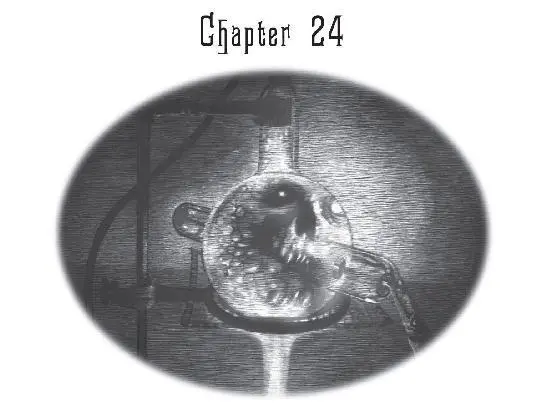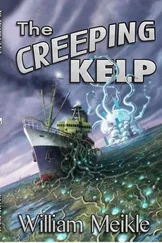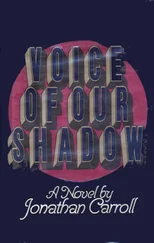He squinted out into the dark. “There’s a gap in the boundary fence there—a missing panel—look, just beyond where the men are standing. What’s that for?”
“So they can drive something in?”
“Why not use the gate by the road?”
I didn’t have an answer to that. Craning my head around further, I noticed something else: a door in the building we stood by. It was made of smooth metal, with a tight rubber seal, and was just a few yards away. There was no clue as to what was behind it.
I showed Lockwood. “It’s an option.”
He hesitated. “I don’t know. Risky. Might be half the Rotwell team in there.”
“What, then? Can’t just stroll out under the floodlights, can we?”
“No….”
“Lockwood!” That was Holly, at the end of the line. She was indicating frantically behind her. Two men, dark-clothed, with equipment shining at their belts, had appeared around the far end of the building. Right now they were staring out into the night, where the pale lights of the Vikings flickered far out across the fields. They were talking, laughing, blissfully unaware of us—but the instant they looked our way, all that would change. We’d be silhouetted against the light.
“Quick, quick!” Lockwood was ushering us around the corner. We had the exact same problem here: the men by the open barn doors would see us if they chose to look up.
We collided against the door. Lockwood grasped the handle, turned it, pushed it open a crack.
“Quick! Quick! In, in, in!”
Ever seen a line of newly hatched ducklings jump one after the other into a stream? Not knowing what was coming, but with no choice but to follow the others, and to leap and hope? That was us, going through that door. Holly, Kipps, George—then Lockwood and me. We were through, fast as blinking, and the seal shut behind us.
It was the decisive action. Once through, we could never take it back.

The good news first. Our arrival caused no outcry, no sudden alarm or attack. We were in a dimly lit chamber and, though it had plenty of horrors in it, no one from the Rotwell Institute was there. The corrugated sides of the building rose in a gentle arch high overhead. Soft lights hung on the walls, electric wires trailing between them. The floor was boarded with cheap wood. A partition wall at the far end of the room opened to another room, but this one would do for now. It was a laboratory.
Three long metal tables ran the length of the space, with chairs and shelved carts between them. On these, neatly separated by lengths of chain, sat an extraordinary variety of apparatuses: silver-glass flasks, tubes and beakers, loops of iron piping, flaring Bunsen burners, crackling electromagnetic coils. Some of the flasks were small, others of colossal size, and all glowed with supernatural energy. You could see the Sources that powered them pressed against the dirty glass—yellowed jawbones, femurs, ribs, and craniums, and rusted lumps of metal that had once been helmets, sword hilts, or arm-rings. These were psychic artifacts of the battle that had taken place here, and the ghosts that clung to them were visible, too. Every container glowed with other-light, with eerie blues and yellows, with darkly sinister greens. The walls of the room swam with conflicting colors. And all the vessels were being experimented on—heated, compressed, electrocuted, frozen….Plasm swirled against silver-glass: I caught a glimpse of twisted faces, impossibly contorted, pluming around and around. The vessels were sealed; I could not hear the imprisoned voices, but I certainly sensed their screams.
“ Look at all this…” Kipps said.
George whistled. “It’s like my bedroom.”
Lockwood peered at a bulbous glass beaker in which a violet plasm boiled and bubbled above a flame. “Can you tell what they’re doing here?”
“Ectoplasmic research, mainly,” George said. “They’re testing how it responds to stuff. To heat, to cold…This one’s suspended in a vacuum, look. That’s interesting: see how diffuse the plasm’s become….And they’re trying to galvanize this spirit with a succession of electric shocks.” He shook his head. “I could tell them that technique doesn’t work. Tried that on our skull a year or more back. Didn’t alter its plasm at all. Just made it grumpy.”
I’d been listening out for the skull when I entered the room, but without success. Now I was staring at a rushing centrifuge, which whirled its imprisoned ghost on an endless loop. “It’s not right,” I said. “It’s not…healthy.”
George looked at me. “I’ve been doing this sort of stuff for years.”
“I rest my case.”
“It’s all part of trying to understand the Problem, Luce,” Lockwood said. “Finding out what makes ghosts tick. It’s a bit extreme, but there’s nothing exactly wrong here.”
I didn’t answer. Lockwood had no love for ghosts; neither he nor George ever spared much sympathy for them. Me? It wasn’t quite that simple. I gazed at the busy work tables, with their pads and pens, their thermometers and stacked tubes. For some odd reason I remembered the vision I’d had of Emma Marchment’s seventeenth-century workroom, filled with the pots and potions she’d used to help her in her witchcraft. This was more high-tech, but otherwise it didn’t seem all that different.
“They’re certainly hard at work in here,” Lockwood said. “Everything mid-experiment. Which raises the question: Where are they?”
Kipps grunted. “Must be something better going on next door.”
This was obviously true, and the laboratory, with all its cruel marvels, did not detain us long. We moved toward the partition at the far side of the shed. As we did so, George gave a cry. He swooped to the nearest table. “Yes! Yes! That’s what I wanted to find!”
Holly stared at the container beside him. “A moldy pelvis?”
“No, you twit—these cigarette butts!” He picked up a jar that someone had been using as an ashtray, and gave it a quick sniff. “Yes, unmistakable—burned toast, a caramel tang! These are Persian Lights! The cigs we found at Aickmere’s. No doubt now. We’re dealing with our friends from Chelsea, for sure.”
“You think that’s good,” Kipps said in a low voice, “you might want to take a look in here.”
I could now see that the partition wall split the building neatly down the middle; the open arch led into a chamber that was almost the mirror image of the first, except with a tubelike passageway leading to another part of the complex.
The room had three long tables in its center. These, in contrast to the madly swirling glows of the tortured ghosts behind us, gleamed dully with more consistent light. They were stacked with boxes and neat piles of objects, laid out in ordered rows. There were canisters and cylinders and firearms. And other things, stranger still.
“Weapons room,” Lockwood breathed. “Check out these flares! Ever seen any that big, Kipps?”
Kipps had pushed up his goggles and was gazing around the room in awe. “We used some pretty hefty ones in the East End once. These are bigger, though.”
George whistled. “I’ll say. They’d do some damage if you chucked them. They’re as big as coconuts! Take the roof off a place, they would.”
We walked along the aisles, opening boxes, peering into sacks. Professional fascination had overtaken us. This was ghost-hunting equipment designed for agents, but equipment we had never seen.
“Got guns here that fire capsules of iron and salt,” Lockwood said. “They would have come in handy in Ealing….But what’s this?”
Читать дальше










